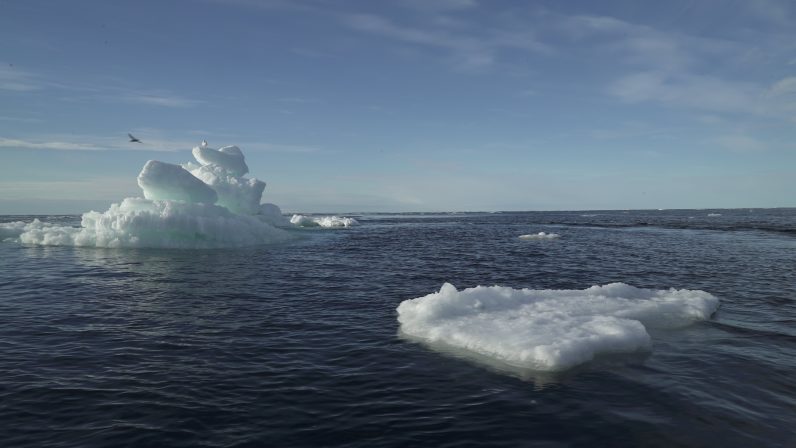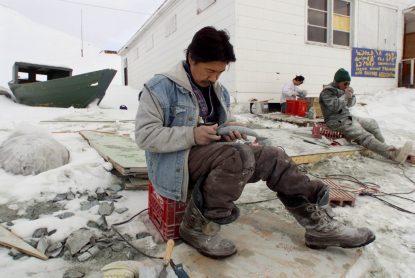
Icebergs are seen floating in the Arctic Ocean Sept. 14, 2020. European Catholic leaders warned that Arctic warming is intensifying competition over the region’s resources and urged tougher policies to protect its biodiversity and Indigenous communities. (CNS photo/Natalie Thomas, Reuters)
OXFORD, England (CNS) — Two European Catholic commissions warned that Arctic warming is intensifying competition over the region’s resources and urged tougher policies to protect its biodiversity and Indigenous communities.
As exploration, mining, investment and military activities increase, predatory practices also can increase, said the Brussels-based Commission of Bishops’ Conferences of the European Union, or COMECE, and Justice and Peace Europe.
“Such exploitative tendencies may not only exclude local communities from a fair share in the profit, but also lead to grave human rights violations and cause irreparable environmental damage,” said the joint statement, issued in mid-November.
[hotblock]
The statement, issued as a contribution to the European Union’s current Arctic policy review, said the region’s 4 million inhabitants included at least 40 Indigenous ethnic groups, whose “social, cultural, religious and linguistic rights” needed greater protection.
“Climate change, along with rapid Arctic warming and ice melting at an unprecedented rate, have opened the region to business, and this has accelerated geopolitical change — the EU has a natural role and responsibility to ensure a sustainable and peaceful Arctic that puts its people in the focus,” the church statement said.
“The future policy framework should incorporate a binding mechanism for corporate social responsibility, ensuring companies performing economic activities in the Arctic region fully comply with internationally recognized human rights, social and environmental standards throughout the entire supply chain.”
Activities in the 5.5 million-square-mile Arctic are regulated by agreements on fishing, endangered species, Indigenous peoples, shipping and pollution, as well as by the 1982 U.N. Convention on the Law of the Sea and 1992 conventions on climate change and biodiversity. Activities are coordinated via an Arctic Council that includes the U.S., Canada, Russia, Iceland, Norway, Sweden, Finland and Denmark, with Greenland and the Faroe Islands.

An Inuit carver is pictured in a file photo working on his art on the shore of Frobisher Bay in the Canadian town of Iqaluit, Nunavut. European Catholic leaders warned that Arctic warming is intensifying competition over the region’s resources and urged tougher policies to protect its biodiversity and Indigenous communities. (CNS photo/Shaun Best, Reuters)
However, the church statement said tighter controls were urgently needed, particularly on ships and tankers using heavy fuel oil, which is not due to be banned until 2024.
It added that thawing ice and permafrost were fueling global warming and extreme weather by releasing billions of metric tons of carbon dioxide, as well as intensifying maritime traffic in pursuit of the region’s “vast natural and mineral resources.”
The region’s inhabitants, dating back 20,000 years, faced “discrimination, trafficking and unemployment,” the statement said, as traditional hunting, fishing and herding practices were stifled.
“The EU should prioritize in its future Arctic framework policies that enable sustainable and integral development of indigenous communities, while respecting their life, specific identity, culture, language and religious beliefs,” the statement said.
“To prevent European companies from becoming accomplices or remaining indifferent to corporate abuses by their subcontractors, it would be important that the EU adopt binding due diligence rules … and provide victims of serious corporate abuses with fair access to an effective remedy.”
Founded in 1980, COMECE includes bishops’ conference delegates from the EU’s 27 member-countries and has backed closer European integration while offering a Catholic contribution to policy formulation.
Justice and Peace Europe incorporates 31 commissions established by bishops’ conferences to promote justice, peace, respect for human dignity and care of creation.
Their joint statement said a new Arctic strategy should strengthen the EU’s role “as a beacon of multilateralism” and reflect the bloc’s founding values of “democracy, the rule of law, the universality and indivisibility of human rights and fundamental freedoms,” as well as the U.N. Charter and international law.
“As networks of faith, trust and hope, churches, religious communities and faith-based organizations have the potential to offer a contribution as drivers and multipliers of the necessary transformations and support sensitizing efforts,” the statement said.
“They are deeply rooted in local realities of the Arctic region, and often among frontline promoters of sustainable human development and peace at the grassroots by offering basic social services, education, health care or engaging in mediation and reconciliation, as well as by fostering social cohesion.”
PREVIOUS: As 2nd hurricane hits Nicaragua: ‘It has been completely disastrous’
NEXT: Dominican sister attacked delivering food in southern Mexico



Share this story